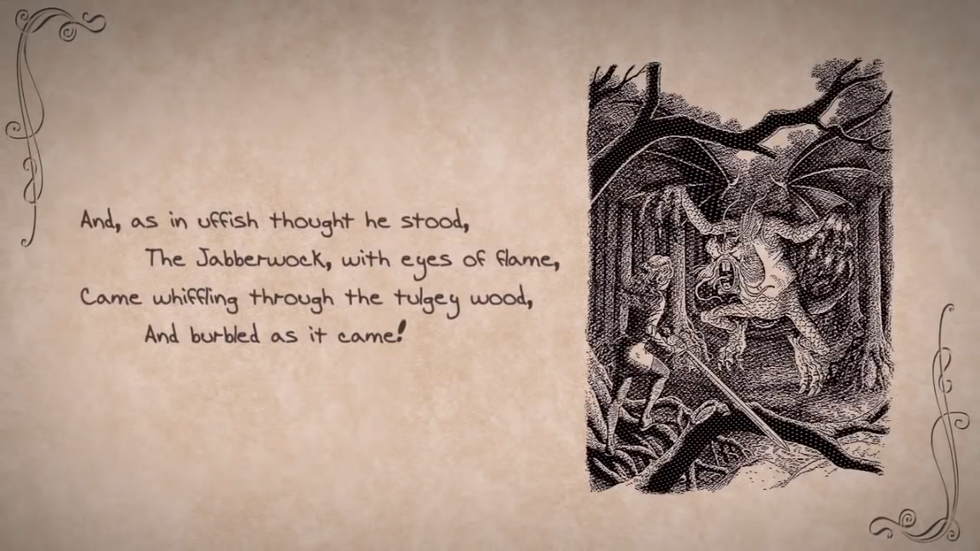In my 7th grade English class, I remember doing an assignment that involved reading "The Jabberwocky" and trying to translate the fanciful words in the most discernible ways. What I did not know at that time that I know now is that Lewis Carroll's poem has gained the attention of linguists for not just the use of these made-up words, but in what contexts they are used. It would appear that my middle school assignment was part of the uncovering of this strange piece of literature.
It can be very easy and fun, since all you really need to do to translate this poem is by seeing which of these words are located within the semantics; in other words, by seeing what is happening at that moment and which words refer to what. As a group of researchers in the Computer Science Department of Madrid University said, the verbs they analyzed in "The Jabberwocky" concluded that they "...are consistent with the contextual meaning of the text." The word "frabjous" can be translated as "joyous" since it appears just after the Jabberwock is slain and is used to describe the day when it happened.
Another clue that helps when examining this nonsensical poem is the use of suffices already used in English, such as -s to indicate plural meaning, as well as -y, -ous, and -ish. There are determiners (the), auxiliary verbs (did), conjugations (and), and prepositions (in) that also come from English, which helps the English speaker to understand where the fictional words they refer to rest within the sentence, not just in a chronological sense but also understanding whether they are the subject or the object, or if they are the noun, adjective, or verb.
Of course, the meanings of the words can only be understood through context, but they might also derive meaning based on sound. Where the meanings can be deciphered is by breaking the words into phonemes that have their own individual meaning and combine to create a unique meaning. This is typical in real-world languages, like Spanish which has the o suffix indicating the modification of a word into an adjective, specifically one that describes a defect or limitation; and even English in which the wr at the beginning of a word usually indicates a twisting sensation, with words such as wry, wrong, and wrest. In the fictional language that seems to permeate Carrell's poem, the method of extracting meaning from the same sounds in the same contexts of English words was used. In the case of a gyre, it can easily relate to the word gyrate.
As for where the made-up words come from, the etymologies have been speculated by linguists as well as told by Carrell himself. The name Jabberwocky itself may have derived from the word "jabber." There are also combinations of known words into a new word--otherwise called a portmanteau--with slithy being the combination of lithe and slimy. There are occurrences of not just English as we know it but also Old English, with the -wock coming from wocor meaning "offspring, fruit." The poem itself is a relic of modern English as words from it have entered into the English lexicon, with the words galumph, chortle, and even Jabberwocky itself.
I definitely think that "The Jabberwocky" is a mind-twister for anyone willing to test their syntactical ability. It definitely no longer makes linguistics into a boring school subject, but rather a creative adventure that forces anyone to think outside what they previously conceived of the very language they use on a daily basis.
















